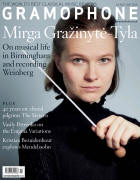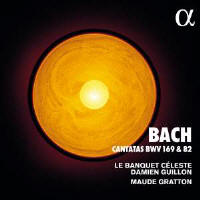Texte paru dans: / Appeared in: |
|
|
Outil de traduction (Très approximatif) |
|
|
Reviewer:
Richard Wigmore Among countertenors to have tackled Ich habe genug, both Andreas Scholl (Decca, 4/12) and Iestyn Davies (Hyperion, 1/17) bring more colouristic range (including more resonant low notes) and a deeper engagement with the text. Taken dangerously slowly, at what sounds like eight beats to the bar (an impression enhanced by the even stressing of the bass line), ‘Schlummert ein’ is smoothly, affectingly sung by Guillon. Yet there is minimal variety of expression and dynamics. I sense no change of tone, for instance, between the slumbrous refrain and what should be the more urgently incisive episodes. A largely unshaped bass line also compromises the two arias with organ in No 169. Guillon, singing with greater expressive intensity than in No 82, and organist Maude Gratton combine eloquently in the bittersweet ‘Stirb in mir’. Yet with monotonous stressing of the recurrent two-note bass figure, the rhythms trudge, devoid of the siciliano lilt caught by Gardiner in his recording with Natalie Stutzmann (SDG, 11/09). Gratton’s understanding of Bachian rhetoric and earcatching choice of registrations make for enjoyable listening in three chorale preludes and the A minor Prelude and Fugue, with a piquant (if initially unnerving) clash of tuning between fundamental and mutation stop in BWV662.
|
|




